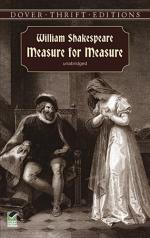|
This section contains 8,304 words (approx. 28 pages at 300 words per page) |

|
SOURCE: “Measure for Measure and the Art of Not Dying,” in Texas Studies in Literature and Language, Vol. 26, No. 1, Spring, 1984, pp. 74-93.
In the following essay, Spinrad analyzes the eventual acceptance of death as a part of life by the major characters in Measure for Measure. The critic examines this acceptance in terms of sixteenth- and early seventeenth-century religious writings that view life on earth as a form of imprisonment, and pays particular attention to Claudio's conduct in the prison scene (Act III, scene i).
In many ways, Shakespeare's Measure for Measure may be considered a culmination of the Morality tradition that extends from Pride of Life to Doctor Faustus: a tradition that poses the moment of death as an understanding of life, offers the soul a last chance on earth to choose salvation or damnation, and dispatches the soul accordingly. But in Measure for Measure, the soul...
|
This section contains 8,304 words (approx. 28 pages at 300 words per page) |

|


